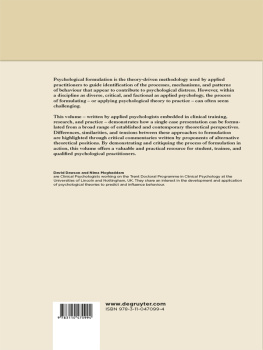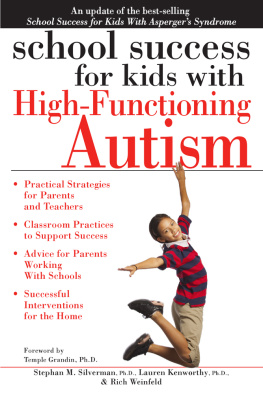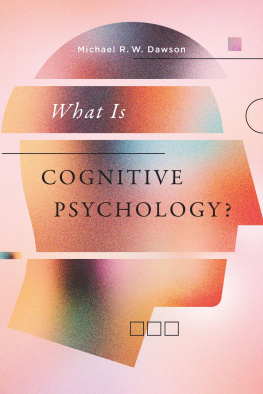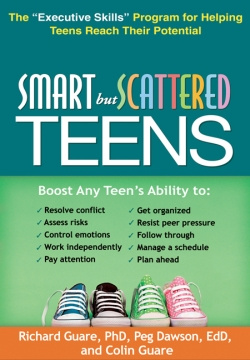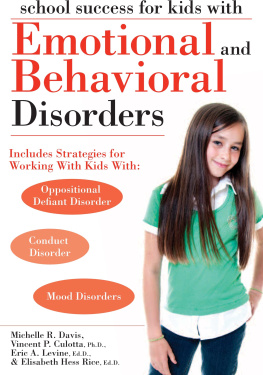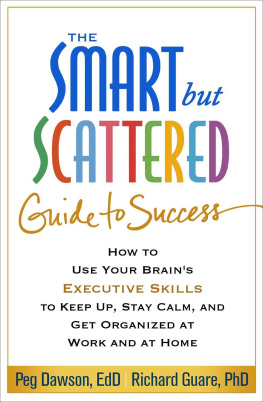
Smart but Scattered
SMARTbut
SCATTERED
The Revolutionary Executive Skills
Approach to Helping Kids
Reach Their Potential
Peg Dawson, EdD
Richard Guare, PhD
THE GUILFORD PRESS
New York
London
2009 The Guilford Press
A Division of Guilford Publications, Inc.
72 Spring Street, New York, NY 10012
www.guilford.com
All rights reserved
The information in this volume is not intended as a substitute for consultation with healthcare professionals. Each individuals health concerns should be evaluated by a qualified professional.
Except as indicated, no part of this book may be reproduced, translated, stored in a retrieval system, or transmitted, in any form or by any means, electronic, mechanical, photocopying, microfilming, recording, or otherwise, without written permission from the Publisher.
Printed in the United States of America
This book is printed on acid-free paper.
Last digit is print number:
LIMITED PHOTOCOPY LICENSE
The Publisher grants to individual purchasers of this book nonassignable permission to reproduce all of the blank forms. This license is limited to you, the individual purchaser, for personal use or use with individual clients. This license does not grant the right to reproduce these materials for resale, redistribution, electronic display, or any other purposes (including but not limited to books, pamphlets, articles, video- or audiotapes, blogs, file-sharing sites, and handouts or slides for lectures, workshops, webinars, or therapy groups, whether or not a fee is charged). Permission to reproduce these materials for these and any other purposes must be obtained in writing from the Permissions Department of Guilford Publications.
Library of Congress Cataloging-in-Publication Data Dawson, Peg.
Smart but scattered : the revolutionary executive skills approach to helping kids reach their potential / Peg Dawson, Richard Guare.
p.
cm.
Includes bibliographical references and index.
ISBN 978-1-59385-987-9 (hardcover : alk. paper)
ISBN 978-1-59385-445-4 (pbk. : alk. paper)
1. Parenting.
2. Executive ability in children.
3. ChildrenLife skills
guides.
4. Child development.
5. Parent and child.
I. Guare, Richard.
II. Title.
HQ755.8.D39 2009
649.1526dc22
2008026078
Contents
Introduction
PART I
What Makes Your Child Smart but Scattered
How Did Such a Smart Kid End Up So Scattered?
Identifying Your Childs Strengths and Weaknesses 26
How Your Own Executive Skill Strengths and Weaknesses Matter 46
Matching the Child to the Task
PART II
Laying a Foundation That Can Help
Ten Principles for Improving Your Childs Executive Skills 71
Modifying the Environment: A Is for Antecedent 81
Teaching Executive Skills Directly: B Is for Behavior 92
Motivating Your Child to Learn and Use Executive Skills: 110
C Is for Consequence
v
vi
Contents
PART III
Putting It All Together
Advance Organizer
Ready-Made Plans for Teaching Your Child to Complete 130
Daily Routines
Building Response Inhibition
Enhancing Working Memory
Improving Emotional Control
Strengthening Sustained Attention
Teaching Task Initiation
Promoting, Planning, and Prioritizing
Fostering Organization
Instilling Time Management
Encouraging Flexibility
Increasing Goal-Directed Persistence
Cultivating Metacognition
When What You Do Is Not Enough
Working with the School
Whats Ahead?
Resources
Index
About the Authors
Introduction
Theres nothing more frustrating than watching a son or daughter who has so much to offer struggle with the typical tasks and functions of everyday life. The other kids in the class can write down the third-grade homework, remember to take the math book home, and then finish the assignment before bedtime. Why cant your daughter do that? When you sit with her, its clear she can do the math, and the teacher confirms that she understands the work. Most kindergartners can sit with the class at circle time for 10 minutes without causing major disruptions. How come your son, whos been reading since pre-K, cant stay there for more than 10 seconds? You have an 8-year-old who cleans his room with minimal fuss, but for your 12-year-old the chore sets off a weekly war. Your friends children dont forget permission slips, lose expensive coats, or fall apart in public. Why does yours?
You know your son or daughter has the brains and the heart to succeed. Yet teachers, your friends, maybe your own parents, and that nagging little voice in your head all say the child isnt where he or she should be. Youve tried everything
pleading, yelling, cajoling, bribing, explaining, maybe even threatening or punishing your child to get him to buckle down and do whats expected of him or muster up the self-control to act his age. Nothing has worked.
Thats because what your child may lack is skills. You cant talk children into using skills they dont have any more than the right incentive could get you safely down a black diamond run when you cant even ski the bunny hill. Your child may very well want and have the potential to do whats required but just doesnt know how. Scientists who study child development and the brain have discovered that most children who are smart but scattered simply lack certain habits of mind called executive skills. These are the fundamental brain-based skills required to execute tasks: getting organized, planning, initiating work, staying on task, controlling impulses, regulating emotions, being adaptable and resilientjust about everything a child needs to negotiate the typical demands of childhood in school, at home, and 1
Introduction
with friends. Some kids lack certain executive skills or lag behind in developing them.
Fortunately, theres a lot you can do to help. This book will show you how you can modify the daily experiences of a child aged 4 to 14 to build the executive skills that will make it possible for the child to get on track and get things done. The groundwork for the development of executive skills in the brain is laid before birth, and you cant control this biological capacity. But neuroscientists now know that these skills develop gradually and in a clear progression through the first two decades of life. This gives you infinite opportunities throughout childhood to boost the executive skills your son or daughter seems to lack.
With the strategies youll learn in this book, you can help your child learn to clean her room, get homework done, wait her turn, handle disappointment, adapt to unexpected changes in plans, manage new social situations, follow directions, obey rules, save her allowance, and much, much more. You can help your son or daughter meet the thousands of other large and small demands that are part of a childs life and reverse an alarming pattern of falling behind in school, losing friends, and generally falling out of step with peers.
Weve seen the methods in this book work for thousands of kids in the school setting and back at home with their families. The strategies require a certain commitment of time and consistency, but none of our methods is difficult to learn or adopt. Some you may even find fun. Theres no doubt that these alternatives to constant supervision, nagging, and cajoling will make your lives together more fun.
What Can This Book Do for You and Your Smart
Next page


